Lemon Benefits: 13 Ways To Boost Heart, Immunity & Skin
Make the most of their high vitamin C content to improve your skin, liver & heart health.
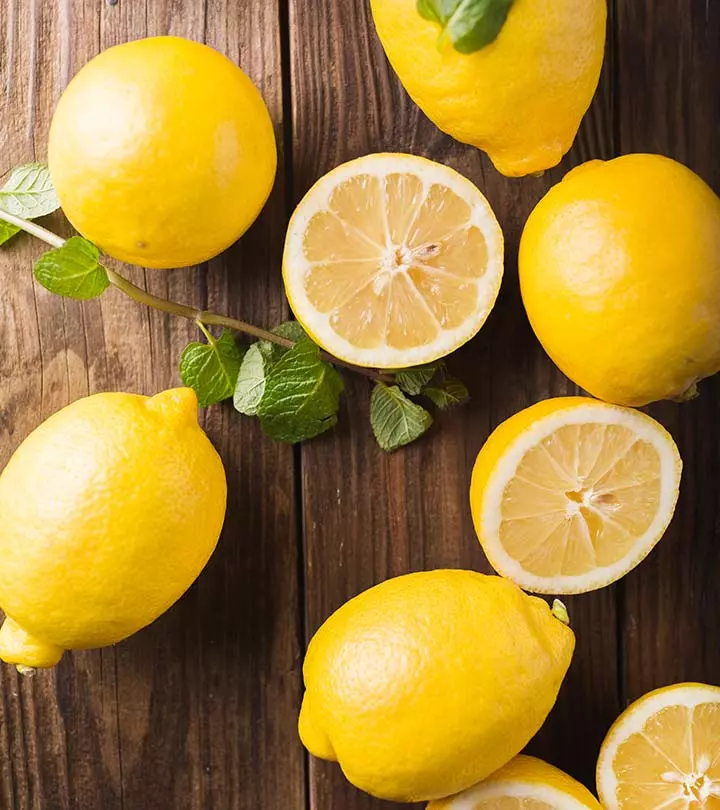
Image: Shutterstock
Lemons are a rich source of Vitamin C(1). A diet including lemon benefits you in multiple ways. The tangy juice of the lemon has 5%- 6% of citric acid and a pH of 2.2. It can enhance the taste of many delicacies, marinades, and drinks and be a perfect salad dressing.
A survey conducted on 4507 US-based participants found that lemons rank ninth among the most popular fruits consumed by Americans. It is liked by 77% of the population and has a popularity rate of 79% and 74% among women and men respectively. Further, it is equally popular among 77% of millennials, 76% of Gen X, and 77% of baby boomers.
Lemons may aid in weight loss and protect you from many cardiovascular diseases (2),(3). If you wish to learn about lemons and their benefits, this article is for you. Read on!
 Know Your Ingredient: Lemon
Know Your Ingredient: LemonWhat Is It?
A yellow citrus fruit with high vitamin C and flavonoid content.
What Are Its Benefits?
Boosts heart health, and helps control body weight and treat kidney stones, and aids cancer treatment.
Who Can Use It?
People with vitamin C deficiency, high blood pressure, or kidney stones.
How Often?
For consumption, 1-2 lemons daily. Topically, a few times a week.
Caution
Excess consumption can erode tooth enamel due to its acidic nature.
Scroll down to know more health benefits of lemons.
In This Article
What Are Lemons?
Lemons are small citrus fruits belonging to the Rutaceae family. They are harvested all year long and are usually green, yellow, or yellowish-green with a sharp, tart flavor. While the exact origin of lemons is unknown, it is believed that they are native to Asia and were first grown in Assam, India.
The juice and rind of lemon are used to make curd, liqueur, desserts, pickles, marmalade, and cocktails. Further, lemon juice is used as a marinade for meats to break down the collagen fibers and tenderize them.
Lemons are rich in essential nutrients that can help improve your overall well-being. Check out the next section to know more.
Key Takeaways
- Lemons have several beneficial properties that can help improve not just your skin health, but also your digestive, liver, and heart health.
- It can also enhance your digestion and prevent constipation.
- The polyphenols in it can prevent fat accumulation and help you lose weight.
- However, excessive consumption of lemon can erode your tooth enamel due to its acidic nature.
13 Health Benefits of Lemons
Are lemons good for you? Check out these amazing benefits of this citrus fruit to find out.
1. Lemons Boost Your Heart Health

Lemons are among the richest sources of vitamin C (1). Studies show us that fruits and vegetables, especially those rich in vitamin C, can prevent coronary heart disease (2).
Studies also found that lemon ingestion and walking lowered blood pressure levels (4).
Citrus fruits, including lemons, contain essential flavonoids that help in the treatment of atherosclerosisi A health condition where the arteries become narrow and hard due to the build-up of cholesterol plaque in the walls of arteries. . These compounds blunt the inflammatory responses in the body that can lead to cardiovascular disease (5).
2. May Help Control Weight
For those on a weight loss journey, lemon for weight loss plays a crucial role by aiding in digestion and metabolism. Some research shows that the polyphenols in lemons help suppress diet-induced obesity (3). These polyphenols were shown to suppress body weight gain and body fat accumulation.
Another study found that the lemon detox diet (organic maple and palm syrups, and lemon juice) helped reduce body fat – thereby reducing body weight and cutting the risk of cardiovascular disease (6).
Some theories also suggest that drinking hot lemon water right in the morning can boost weight loss.
However, most studies in this regard have been performed on animals. More research on humans is warranted.
3. May Help Treat Kidney Stones

Lemons contain citrate, a chemical that prevents the formation of kidney stones (7). Citrate also breaks down bigger stones, allowing them to pass easily through urine.
In a study, drinking four ounces of reconstituted lemon juice in two liters of water every day decreased the rate of stone formation (8). Citrate achieves this by binding to calcium and blocking stone formation (9).
4. May Treat Anemia
Vitamin C in lemons promotes the absorption of iron from plant foods, thereby treating anemia (10).
Your gut tends to absorb the iron from animal sources more easily as compared to plant sources. Vitamin C in lemons can help in improving overall iron absorption.
5. May Cancer Treatment
Some observational studies found that individuals consuming citrus fruits, like lemons, had a lower risk of pancreatic cancer (11).
Similar findings have been observed in the case of stomach cancer(12).
Some experts hypothesize that the anticancer properties of lemons can be attributed to their flavonoids (13).
Certain animal studies found that D-limonene, a compound in lemon oil, may have anti-cancer properties (14).
6. May Boost Digestive Health
Drinking lemon water benefits your skin, hair, and overall well-being. Some theories suggest that drinking lemon water in the morning can aid digestion and relieve constipation.
Drinking lemon water when you wake up may keep your digestive system moving. While, we need more research on this, some also claim that lemons are great for detoxification, and hence can boost digestion.
 Fun Fact
Fun Fact7. May Promote Immunity
The vitamin C in lemons can promote immunity in humans. Studies show that this vitamin can reduce the duration of a cold, an ailment that occurs due to a weak immune system (15).
Lemons can also have protective effects against asthma. One study shows that individuals with asthma and other bronchial issues benefited from the consumption of vitamin C (16).
Mixing lemon with honey may also help treat cough.
8. May Enhance Liver Health

Lemons possess antioxidant properties that may enhance liver health. In one study, lemon juice showed protective effects on mice with alcohol-induced liver injury (17).
In another study, citrus fruit oil was found to improve hepatotoxicity in chickens fed with a diet containing aflatoxin (a potent hepatocarcinogeni An agent or substance, naturally occurring or otherwise, which causes or tends to cause liver cancer. ) (18).
9. May Help Fight Acne
Incorporating citrus fruits for skin into your diet can further improve its health. Theories suggest that the citric acid in lemons can have a drying effect on the skin, reducing surface sebum levels. The citric acid may also have antiseptic properties, which may eliminate the acne-causing bacteria.
Studies show that vitamin C has anti-inflammatory properties and can be used for treating conditions like acne vulgaris (19).
However, lemons may not be suitable for some skin types and may cause side effects like burning, stinging, itching, or redness for a few people. Hence, you should always do a patch test before using lemons on your skin.
These are a few proven ways in which lemons can benefit you. Lemons have also been used in a few other ways, though there is no concrete research to support their beneficial effects in those applications. Anecdotal evidence supports the benefits covered below.
10. Lemons May Reduce Wrinkles
This may have to do with the vitamin C in lemons. The nutrient boosts collagen and may help reduce wrinkles.
11. May Help Lighten Underarms
Though we don’t know how lemons can help achieve this, some anecdotal evidence suggests it works.
Cut thick slices of lemon and rub them on your underarms. Leave the juice on for 10 minutes and then wash your underarms with cool water. Pat them dry and apply moisturizer.
12. May Lighten Stretch Marks

There is very little information on how lemons can help lighten stretch marks. But anecdotal proof tells us they may work.
You can slice open a lemon and add the juice to a bowl. Apply this juice, in circular motions, onto your stretch marks. Ensure the juice soaks into your skin. This may take about 5 to 10 minutes. You can then wipe it off.
Some theories suggest that the fruit acids in lemons can bleach the skin and reduce the appearance of stretch marks.
After wiping off the lemon juice, you can apply an emollienti A substance or ingredient that helps moisturize the skin by forming a protective barrier on the skin to seal the moisture. (like cocoa butter) to the stretch marks. This can soothe and soften the skin and reduce the appearance of stretch marks.
13. May Aid Eczema Treatment
Applying lemon juice to the affected regions may offer some relief. Apply it twice to thrice a day, allowing it to stay for 10 to 15 minutes each time.
But since there is very little information regarding this aspect, we suggest you speak to your doctor.
 Quick Tip
Quick TipKrista Cannady, a YouTuber, tried a seven-day challenge to drink a gallon of lemon water daily, aiming to explore the potential health benefits associated with this practice. By the end of the challenge, she observed potential changes in her skin and said, “My skin was more quenched. I did feel like it was more um bouncy (i).”
Not only are lemons a nutritional powerhouse, but they also have a rich history of medicinal use. For instance, fresh lemon juice was used in Ayurveda to treat arthritis and digestive disorders (20). Romanians traditionally used lemon essential oil with sugar to suppress coughs. Lemon juice was also used in treating ailments like scurvy, fever, high blood pressure, and sore throat. In Indian traditional medicine, two teaspoons of lemon juice was used twice daily to induce menstruation. South Americans also used lemon juice with olive oil to treat womb infections and kidney stones (21).
These are the various benefits lemons have in store for you. Yes, we know lemons are one of the richest sources of vitamin C. But there are other nutrients these fruits contain that can contribute to your health. What are they?
What Is The Nutritional Value Of Lemons?
| Calorie Information | ||
|---|---|---|
| Amounts Per Selected Serving | %DV | |
| Calories | 61.5(257 kJ) | 3% |
| From Carbohydrate | 48.3(202 kJ) | |
| From Fat | 5.3(22.2 kJ) | |
| From Protein | 7.8(32.7 kJ) | |
| From Alcohol | 0.0(0.0 kJ) | |
| Carbohydrates | ||
| Amounts Per Selected Serving | %DV | |
| Total Carbohydrate | 19.8g | 7% |
| Dietary Fiber | 5.9g | 14% |
| Starch | ~ | |
| Sugars | 5.3g | |
| Vitamins | ||
| Amounts Per Selected Serving | %DV | |
| Vitamin A | 46.6IU | 1% |
| Vitamin C | 112mg | 187% |
| Vitamin D | ~ | ~ |
| Vitamin E (Alpha Tocopherol) | 0.3mg | 2% |
| Vitamin K | 0.0mcg | 0% |
| Thiamin | 0.1mg | 6% |
| Riboflavin | 0.0mg | 2% |
| Niacin | 0.2mg | 1% |
| Vitamin B6 | 0.2mg | 8% |
| Folate | 23.3mcg | 6% |
| Vitamin B12 | 0.0mcg | 0% |
| Pantothenic Acid | 0.4mg | 4% |
| Choline | 10.8mg | |
| Betaine | ~ | |
| Minerals | ||
| Amounts Per Selected Serving | %DV | |
| Calcium | 55.1mg | 6% |
| Iron | 1.3mg | 7% |
| Magnesium | 17.0mg | 4% |
| Phosphorus | 33.9mg | 3% |
| Potassium | 293mg | 8% |
| Sodium | 4.2mg | 0% |
| Zinc | 0.1mg | 4% |
| Copper | 0.1mg | 0% |
| Manganese | 0.1mg | 3% |
| Selenium | 0.8mcg | 1% |
| Fluoride | – | |
Source: USDA
A single lemon contains about 16.8 calories and 5.4 grams of carbohydrates. It also contains 30.7 mg of vitamin C (51% of Daily Value), 6.4 mcg of folate (2% of DV), 15.1 mg of calcium (2% of DV), 0.3 mg of iron (2% of DV), and 80 mg of potassium (2% of DV).
Now that you know how beneficial lemons can be, let’s help you include them in your daily wellness routine with this simple lemon water recipe.
How To Prepare Lemon Water
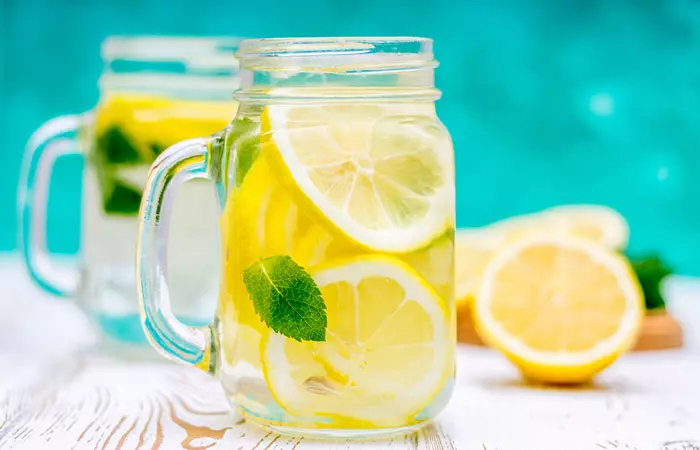
Many people enjoy drinking lemon water, especially on hot humid days. It helps keep you hydrated and maintain your electrolyte balance.
Ingredients:
- Lemon juice (from ½ –1 lemon )
- Water – 240ml (1 cup)
Instructions:
- Rinse the lemons well and roll them on a flat surface to release maximum juice.
- Cut the lemon in half and squeeze the juice out with a citrus/lemon squeezer.
- Add a little salt, sugar, or honey as per your preference. Mix well.
- Add a cup of cold or lukewarm water.
- Add mint leaves, ginger, cinnamon, or black salt for additional flavoring.
Drinking freshly squeezed lemon water can help you reap its many health benefits easily. However, there are a few side effects that you must be aware of as well.
Side Effects Of Lemons
- While lemons are generally well-tolerated by most people, a small number of people may find themselves allergic to lemons along with other citrus fruits (22).
- People with dermatitisi A general term used to refer to common forms of skin irritation and inflammation caused by allergy, genetics, or skin damage. may also get contact allergies and skin irritation when they come in contact with lemons (23).
- Excess intake of lemons may even decay your tooth enamel, in addition to the other side effects (24). So, you should make sure to brush your teeth after drinking lemon water.
- Anecdotal evidence suggests that consuming too much lemon may upset your stomach, cause heartburn, and in rare cases, may even cause GERDi Gastroesophageal reflux disease, a digestive condition where the stomach acid irritates the food pipe lining. . However, this is not yet backed by scientific research.
Infographic: 6 Reasons To Make Lemon A Part Of Your Diet
Beyond its zesty flavor and refreshing aroma, lemon is a powerhouse of benefits. This bright yellow fruit is not just for garnishing or making lemonade! It can be a transformative addition to your daily diet. Check out the infographic below to discover six reasons to incorporate lemon into your diet.
Some thing wrong with infographic shortcode. please verify shortcode syntaxNow, that you are aware of the several lemon benefits, you can use them in your diet and wellness routine as per your requirements. Lemons are a rich source of vitamin C and flavonoids that can boost immunity and promote heart, digestive, and liver health. They can also aid in weight control, treat acne, reduce wrinkles, and lighten the underarms. In addition, lemons positively affect the treatment of cancer, anemia, eczema, and kidney stones. However, be wary of their side effects too. They may cause burning, stinging, and itching in a few.
Frequently Asked Questions
How to keep lemons fresh?
You can store lemons in a sealed plastic bag in the refrigerator. Storing them this way can keep them fresh for a long time.
How long do lemons last?
At room temperature, lemons stay fresh for about a week. In the refrigerator, they can last for up to 3 weeks. But cut lemons may last only for 4 days in a refrigerator. Storing lemons (both cut and uncut) in a plastic bag in a refrigerator can extend their shelf life.
Is a lemon the same as a lime?
They belong to the same citrus family and have the same nutritional values and benefits. The only difference lies in their appearance – while lemons are yellow and bigger, limes are green and smaller.
How many lemons can you eat in a day?
You can have 2 to 3 lemons a day. Excess intake may lead to the possible side effects mentioned above.
Excess intake of lemons can even decay your tooth enamel, in addition to causing other side effects.Thus, be sure to brush your teeth after ingestion.
What are the other uses of lemons?
You can use lemons in the following ways:
• Use lemon peels to clean kitchen surfaces, including microwave ovens.
• Add lemon juice to hot water and have lemon tea.
• You can also include lemons in your favorite pickles.
• Use lemon zest to add flavor to foods.
Lemons may also help repel fleas. Simply rubbing a cut lemon over your pet’s fur might help. You can also apply the juice to your pet’s fur using a dropper. Lemon water can also have similar benefits as that of lemons.
Are lemons alkaline?
Lemons are naturally acidic (with a pH of 2), but they become alkaline once metabolized (to a pH of 7). Thus, it has an alkalizing effect after being processed in the body.
Does lemon water burn belly fat?
No, lemon water helps in reducing body fat by boosting metabolism. But there is no research that suggests lemon water helps in specifically reducing belly fat.
Should lemon water be warm or cold?
Health experts say that drinking warm or room-temperature lemon water provides more health benefits and hydration compared to drinking it cold.
Is lemon good for male sperm?
No, lemon juice was found to have a low pH, which causes a reduction in sperm movements (25)
Illustration: Incredible Health Benefits Of Lemons And Nutritional Value

Image: Stable Diffusion/StyleCraze Design Team
Lemons are a powerhouse of vitamin C and other health benefits! Watch this video to know more about the 12 amazing yet hidden benefits of lemons.
Personal Experience: Source
StyleCraze's articles are interwoven with authentic personal narratives that provide depth and resonance to our content. Below are the sources of the personal accounts referenced in this article.
i. I drank a gallon of lemon water every day for a week | any results?https://www.youtube.com/watch?v=mjUszuQ9EF8
References
Articles on StyleCraze are backed by verified information from peer-reviewed and academic research papers, reputed organizations, research institutions, and medical associations to ensure accuracy and relevance. Read our editorial policy to learn more.
- “Lemons, raw, with peel…” SELFNutritionData.
- “The effect of fruit and vegetable intake…” Annals of Internal Medicine, US National Library of Medicine.
- “Lemon polyphenols suppress diet-induced…” Journal of Clinical Biochemistry and Nutrition, US National Library of Medicine.
- “Effect on blood pressure of…” Journal of Nutrition and Metabolism, US National Library of Medicine.
- “Citrus flavonoids and lipid metabolism” Current Opinion in Lipidology, US National Library of Medicine.
- “Lemon detox diet reduced body fat…” Nutrition Research, US National Library of Medicine.
- “6 easy ways to prevent kidney stones” National Kidney Foundation.
- “Five ways to prevent kidney stones…” UC San Diego Health.
- “5 things that can help you take a...” Harvard Medical School.
- “The effects of fruit juices and fruits…” The British Journal of Nutrition, US National Library of Medicine.
- “Citrus fruit intake and pancreatic cancer…” Pancreas, US National Library of Medicine.
- “Citrus fruit intake and stomach cancer…” Gastric Cancer, US National Library of Medicine.
- “Natural products for cancer-targeted…” Asian Pacific Journal of Cancer Prevention, US National Library of Medicine.
- “Effects of D-limonene on hepatic microsomal…” Xenobiotica, US National Library of Medicine.
- “Vitamin C for preventing and treating the…” The Cochrane Database of Systematic Reviews, US National Library of Medicine.
- “Vitamin C and common cold-induced asthma…” Biomed Central Journals.
- “Protective effects of lemon juice…” Biomed Research International.
- “Evaluation of pathological changes in broilers…” Research in Veterinary Science, US National Library of Medicine.
- “Vitamin C in dermatology” Indian Dermatology Online Journal, US National Library of Medicine.
- Pharmacognostical evaluation of Citrus jambhiri Lush. fruit, US National Library of Medicine.
https://pmc.ncbi.nlm.nih.gov/articles/PMC4389400/ - Citrus limon (lemon) phenomenon—A review of the chemistry, pharmacological properties, applications in the modern pharmaceutical, food, and cosmetics industries, and biotechnological studies, US National Library of Medicine.
https://pmc.ncbi.nlm.nih.gov/articles/PMC7020168/ - Citrus Allergy from Pollen to Clinical Symptoms – PMC
https://www.ncbi.nlm.nih.gov/pmc/articles/PMC3537725/ - Allergic contact dermatitis resulting from sensitivity to citrus peel, geraniol, and citral
https://pubmed.ncbi.nlm.nih.gov/2526827/ - A conservative treatment approach using direct composite resins for anterior teeth eroded by lemon sucking
https://pubmed.ncbi.nlm.nih.gov/23928446/ - Sperm immobilizing properties of lemon juice
https://pubmed.ncbi.nlm.nih.gov/16566931/
Read full bio of Julie Freeman
Read full bio of Varsha Patnaik
Read full bio of Ravi Teja Tadimalla
Read full bio of Payal Karnik










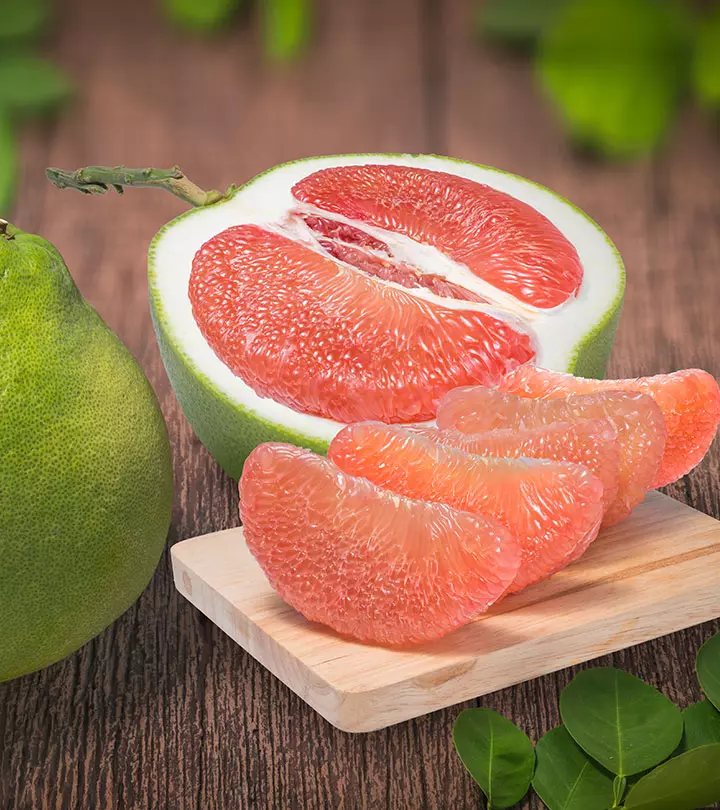



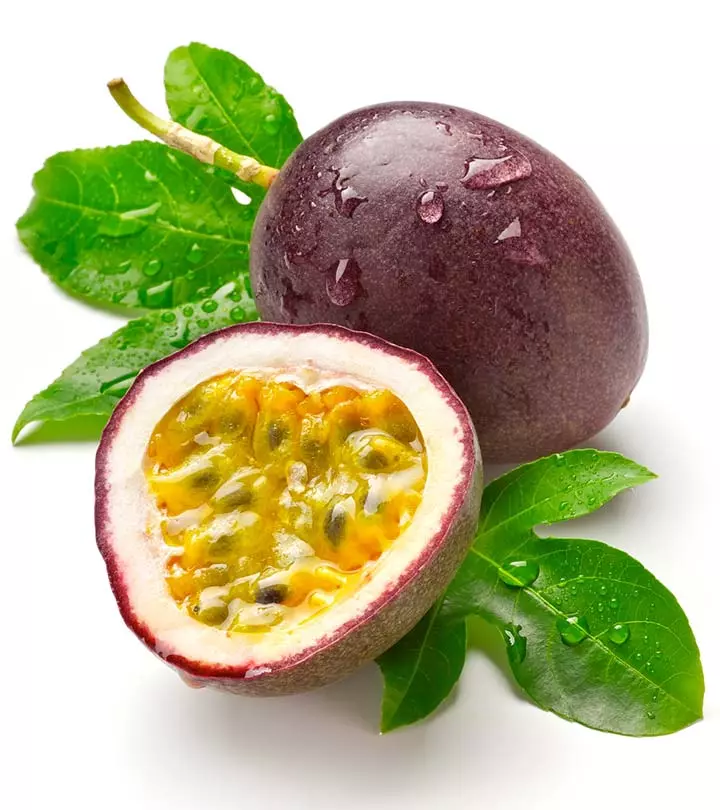

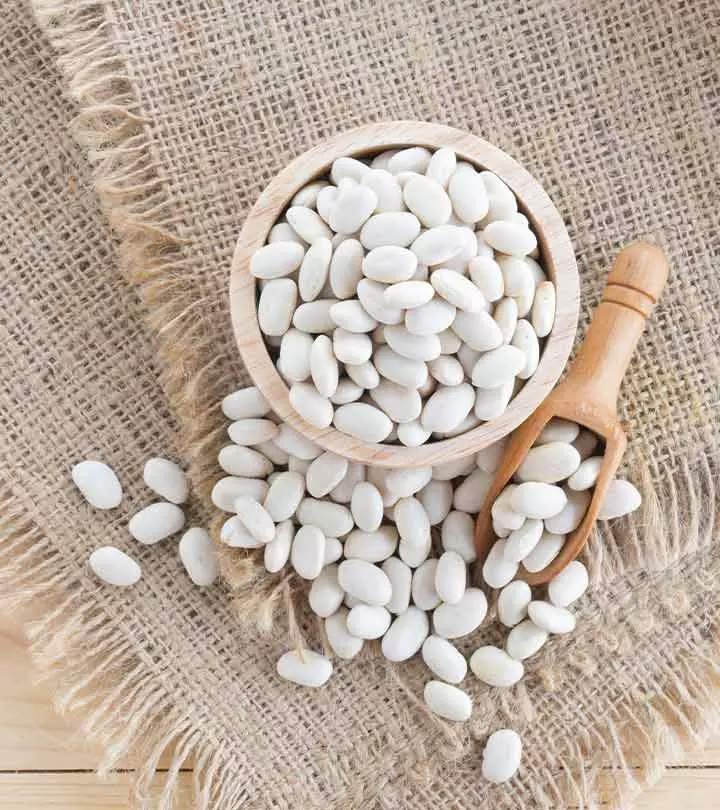


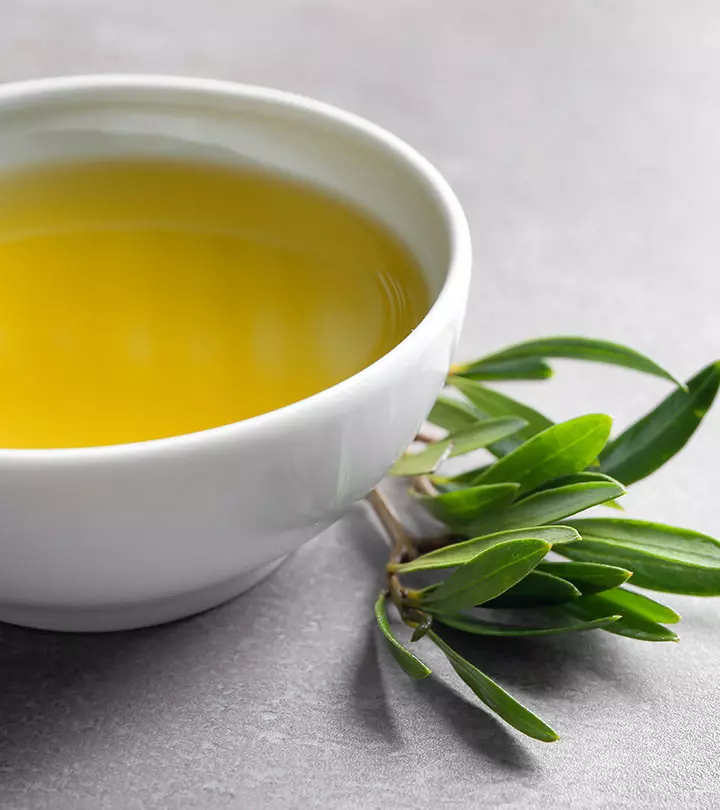

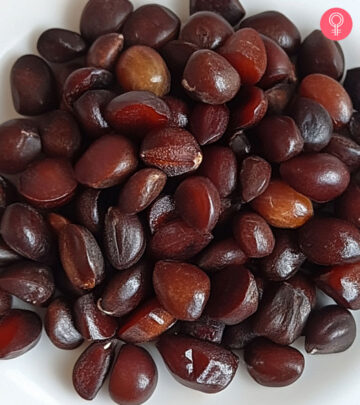

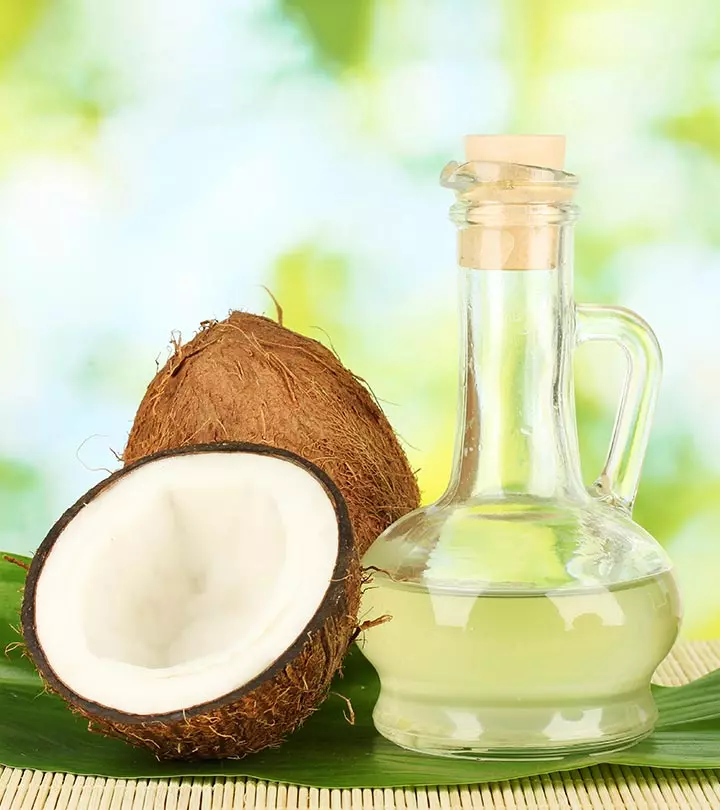



Community Experiences
Join the conversation and become a part of our empowering community! Share your stories, experiences, and insights to connect with other beauty, lifestyle, and health enthusiasts.